#vol 155
Explore tagged Tumblr posts
Text
the way people treat kon & clark's relationship in fanon vs how it is in [postcrisis] canon is honestly one of the most buckwild things. bc they always pull on "well yja clark was an asshole" or something and translate that to comics canon even when theres just NO basis for it.
canon postcrisis comics: kon brags about getting to work with clark. kon tells clark about his rogues gallery. kon cries from joy when clark says he's family to him. when kon worries clark doesn't trust him, clark tells him he trusts him with his life and that he feels closest to him of any of the superfam. via a time travel thing, young clark says he would want kon to be able to look up to him almost like a father figure. clark teaches kon how to milk a cow. when superman's been poisoned and is slowly dying, kon says he'll do anything to save him. he admires clark so much!!!! a direct kon quote: "every time i see the guy, it's like looking at everything i wanna be!"
fanon, for some reason: clark is really cold and mean to kon. he wouldn't trust him around jon and he doesn't want him in his home. kon is really angsty about this and also very resentful of clark.
like. yeah. sure. right. tell me u have never touched a superfam comic without telling me.........
#rimi talks#i guess in tt03 geoff did some weird shit with kon & clark but its like. lol. thats tt03.#but overall its just the fucking damage yja has wrought. can yall just leave that shit in the yja tags :|#(they cannot bc they dont read comics so they dont know better. and yet they put it in the comics tags.)#perhaps when im done with my big superman readthrough i will go through and make a list of personal fav kon & clark issues#superman vol 2 155 save me. save me superman vol 2 155#kon#clark
117 notes
·
View notes
Text

15 notes
·
View notes
Text
kon really is a chip off the ol' block <3 (from ac 779)

whoops!
ANYWAY
Could y'all respond by posting your favorite Kon and Clark (or general Superfam) moments from the comics? Bring some positivity back into the Superfam.
#this moment just lives in my mind rent free. whoops! what's more to say.#i was also rly tempted to put panels from sb94 70 or superman vol 2 155 but maybe ill do those in extra rbs fdskjh#kon#clark#superfam
156 notes
·
View notes
Text

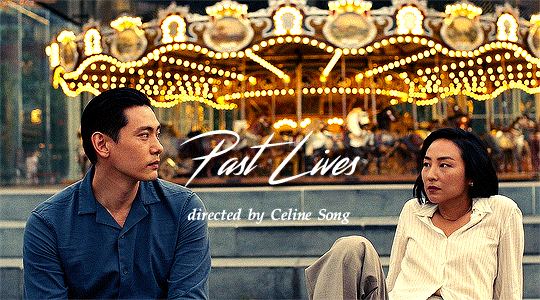


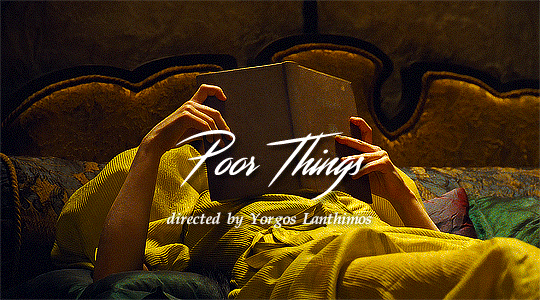
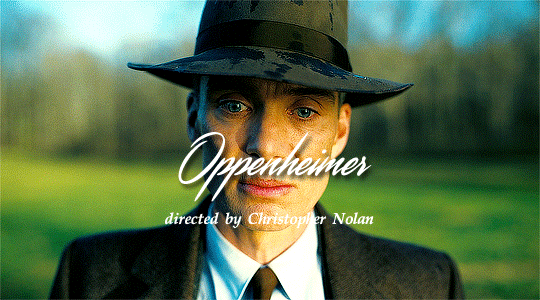
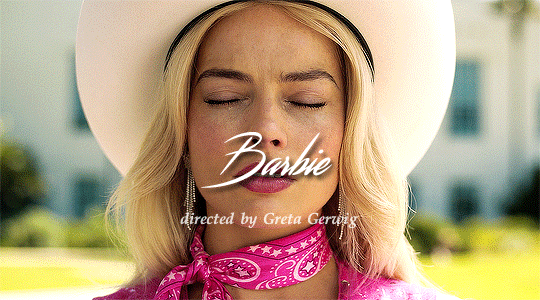
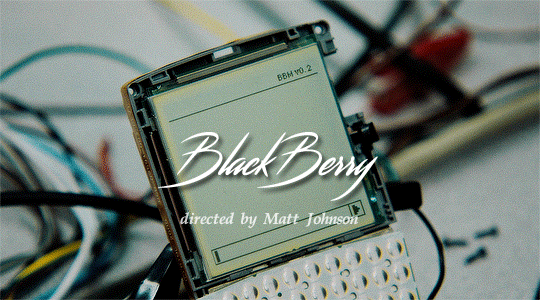

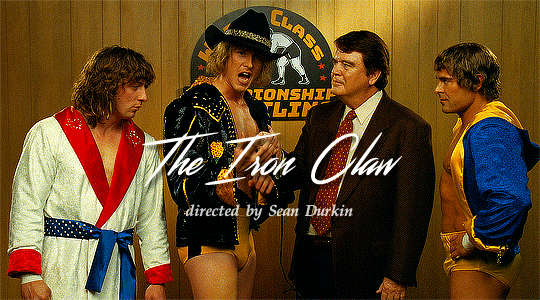
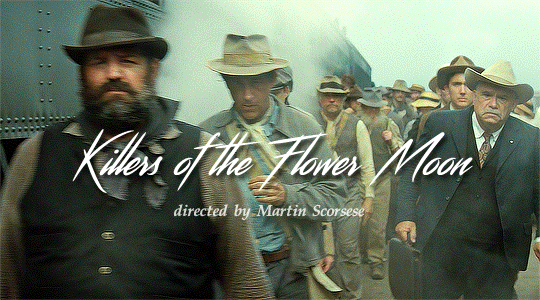
TOP 10
Past Lives
Spider-Man: Across the Spider-Verse
How to Blow Up a Pipeline
Poor Things
Oppenheimer
Barbie
BlackBerry
The Holdovers
The Iron Claw
Killers of the Flower Moon
MY LETTERBOXD Grade A 11. The Killer 12. Beau Is Afraid 13. Dream Scenario 14. Guardians of the Galaxy Vol. 3 15. Godzilla Minus One 16. American Fiction 17. They Cloned Tyrone 18. Evil Dead Rise 19. Eileen 20. The Artifice Girl 21. Teenage Mutant Ninja Turtles: Mutant Mayhem 22. Talk to Me 23. Reality 24. Leave the World Behind 25. A Thousand and One 26. Mission: Impossible – Dead Reckoning Part One 27. Are You There God? It’s Me, Margaret. 28. Theater Camp 29. Carmen 30. Merry Little Batman 31. Priscilla 32. Society of the Snow 33. Infinity Pool 34. Enys Men 35. Sanctuary 36. Rye Lane 37. Skinamarink 38. Monster 39. Anatomy of a Fall 40. Landscape with Invisible Hand 41. Reptile 42. Sisu 43. Pinball: The Man Who Saved the Game 44. No One Will Save You 45. Tetris 46. May December 47. The Zone of Interest 48. V/H/S/85 49. Dumb Money 50. El Conde 51. Arnold 52. Maestro 53. Napoleon 54. 20 Days in Mariupol 55. Influencer 56. The Creator 57. Origin 58. Thanksgiving 59. Next Goal Wins 60. The Boy and the Heron 61. Bottoms 62. Wonka
[Press Keep Reading For The Full Graded List]
Grade B
63. God Is a Bullet 64. No Hard Feelings 65. Joy Ride 66. Fair Play 67. Cocaine Bear 68. NYAD 69. Asteroid City 70. Nowhere 71. The Angry Black Girl and Her Monster 72. Divinity 73. The Equalizer 3 74. The Last Voyage of the Demeter 75. Venus 76. Butcher’s Crossing 77. Somewhere in Queens 78. The Persian Version 79. Boston Strangler 80. Polite Society 81. Miguel Wants to Fight 82. The Color Purple 83. The Royal Hotel 84. Saw X 85. All of Us Strangers 86. Fallen Leaves 87. Ferrari 88. Elemental 89. Peter Pan & Wendy 90. Renfield 91. Cat Person 92. Scream VI 93. The Hunger Games: The Ballad of Songbirds & Snakes 94. BS High 95. Blue Beetle 96. Huesera: The Bone Woman 97. When Evil Lurks 98. Dark Harvest 99. A Good Person 100. Final Cut 101. Knock at the Cabin 102. Quiz Lady 103. Leo 104. Air 105. The Super Mario Bros. Movie 106. Batman: The Doom That Came to Gotham 107. John Wick: Chapter 4 108. Beaten to Death 109. The Wrath of Becky 110. Passages 111. Transformers: Rise of the Beasts 112. Gran Turismo 113. 65 114. Sick 115. Sister Death 116. The Blackening 117. Please Don’t Destroy: The Treasure of Foggy Mountain 118. Flamin’ Hot 119. Nimona 120. Cobweb 121. Totally Killer 122. What’s Love Got to Do with It? 123. Sharper 124. Unseen 125. Dunki 126. Bird Box Barcelona 127. The Marvels 128. Shazam! Fury of the Gods
Grade C
129. Wildflower 130. Freelance 131. M3GAN 132. Strays 133. Sympathy for the Devil 134. Creed III 135. Chevalier 136. The Marsh King’s Daughter 137. A Haunting in Venice 138. The Little Mermaid 139. Silent Night 140. Master Gardener 141. The Flash 142. Fast X 143. The Pope’s Exorcist 144. Saltburn 145. Kandahar 146. Stand 147. Plane 148. Indiana Jones and the Dial of Destiny 149. Fingernails 150. Quicksand 151. Fool’s Paradise 152. Migration 153. Rustin 154. The Covenant 155. Good Burger 2 156. The Pod Generation 157. Alice, Darling 158. Insidious: The Red Door 159. Missing 160. Shotgun Wedding 161. You Hurt My Feelings 162. The Boogeyman 163. Showing Up 164. Aquaman and the Lost Kingdom 165. Champions 166. Consecration 167. The Nun II 168. Biosphere 169. House Party 170. The Exorcist: Believer 171. Big George Foreman 172. Dungeons & Dragons: Honor Among Thieves 173. Children of the Corn 174. The Beanie Bubble 175. Ant-Man and the Wasp: Quantumania
Grade F
176. Anyone But You 177. Marlowe 178. Paint 179. Extraction 2 180. It Lives Inside 181. Deliver Us 182. Trolls Band Together 183. Finestkind 184. Corner Office 185. Wish 186. Prisoner’s Daughter 187. Pain Hustlers 188. Foe 189. The Mother 190. Old Dads 191. Ghosted 192. Ruby Gillman, Teenage Kraken 193. Haunted Mansion 194. Mafia Mamma 195. Five Nights at Freddy’s 196. The Machine 197. Justice League: Warworld 198. We Have a Ghost 199. What Comes Around 200. Legion of Super-Heroes 201. The Boys in the Boat 202. Attachment 203. Operation Fortune: Ruse de Guerre 204. About My Father 205. You People 206. Meg 2: The Trench 207. Pathaan 208. Rebel Moon - Part One: A Child of Fire 209. Assassin 210. Dalíland 211. Vacation Friends 2
Bottom 10
212. Sound of Freedom 213. Winnie the Pooh: Blood and Honey 214. When You Finish Saving The World 215. Heart of Stone 216. Family Switch 217. Expend4bles 218. Sweetwater 219. Hypnotic 220. 80 for Brady 221. Spinning Gold
#kane52630#filmedit#top 10 2023#top 10 year#usergal#userlera#userkd#userbrittany#mikaeled#userconstance#userel#past lives#spider man across the spider verse#how to blow up a pipeline#poor things#oppenheimer#barbie#blackberry#the holdovers#the iron claw#killers of the flower moon#movie
1K notes
·
View notes
Text
Today I finally decided to check something a friend told me a while ago. It was about Robespierre allegedly supporting and pushing for a full scale invasion of Italy, an idea that came from his younger brother Augustin and Napoléon.
The evidence for such claim is mentioned in Mary Young's biography on Augustin Robespierre. This is what Young has to say about it:

(page 142).
So not only was Carnot - someone who's considered responsible for turning a war of defense into one of conquest by robespierrist historians - unexpectedly against the idea of invading Piedmont, but Maximilien Robespierre, even more unexpectedly, was pushing for it.
And there's more: at page 154 - 155, Young mentions, quoting a work by J. Colin, that the reason why the CSP fell apart was because Robespierre interfered with war affairs to the point of alienating Carnot. While the latter was indeed against invading foreign countries, Robespierre, on the contrary, approved it and wanted it to be accomplished:

So it seems like the story about great advocate of peace, Maximilien Robespierre, is indeed just a story...!
Because of course a historian, whose book presents a foreword by Marisa Linton, wouldn't completely intentionally or unintentionally twist and misunderstand sources, right?
Right!?
Wrong.
The sources which Young uses to support her ideas are from Histoire de la campagne de 1794 en Italie by Gabriel Fabry vol 2, p. 438 and L’Éducation Militaire de Napoléon by J. Colin. Let's give them a quick look.
Fabry's histoire simply reports a CSP decree showing a certain eagerness in wanting to invade Piedmont. The excerpt, as you can see, doesn't include any signature.

(pages 438 - 439.)
Since Young said that Robespierre approved it, one would be inclined to think that it was Maximilien who wrote and signed the decree, with his signature being the first one. Of course the handwriting and signature of a CSP member isn't absolute proof of approval, but I usually see these two things used as arguments to show that a CSP member agreed; even by reputed historians; so I wasn't surprised to see Young making such a bold assumption. I then checked Aulard's Recueil and surprise surprise that decree was written and signed by Carnot only. No trace of Robespierre:

(I underlined in cyan the part similar to what Fabry reported, since Aulard made only a summary of the decree.)
Concerning the fact that Carnot was opposed to Robespierre's - yes, because Colin considers it as such - warmongering plans, the latter mentions a letter dated 26 Thermidor, in which Carnot complains about it:

I happened to find that letter in Correspondance générale de Carnot vol. 4, p. 575 - 576:
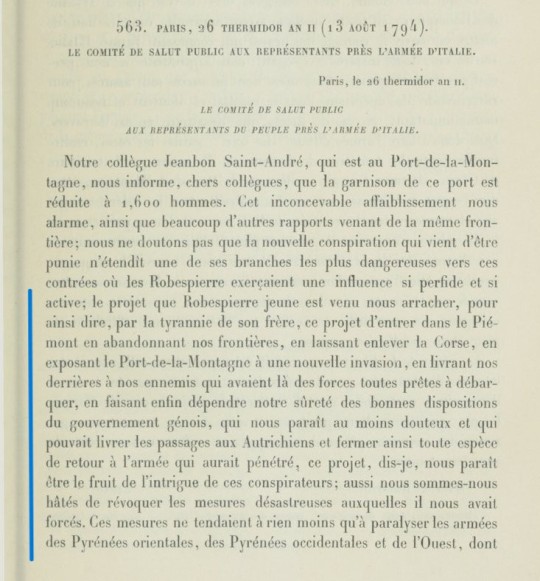
To sum up, it says that the plan comes from the mind of Augustin, but that it was the tyranny of his brother that inspired it.
Now, this is a letter written shortly after the fall of the Robespierrists, it doesn't take much to understand that this is purely thermidorian propaganda, not only because of its content, but also for the wording used. Moreover, it's not a personal letter, in which Carnot rambles with a friend or relative, it's an official one from the Committee of Public Safety.
Saying that Carnot didn't approve the conquest of Piedmont whereas Maximilien Robespierre did - I actually don't know if it was Augustin's idea, but this is not the point right now - is simply wrong since the decree of 19 floréal quoted above has been written and signed exclusively by him.
Thinking that a historian didn't care to double check their sources leading to such a misinformed mess is... truly appalling. This is proof of how one should always double check sources when possible, even if they come from historians we trust or appreciate!
Not that I personally trust or appreciate Young, considering that another of her bizarre claims based on dubious sources almost caused a sort of Thermidor in the community almost one year ago...
EDIT: Mary Young wasn't a historian, but a psychologist, so I did wrong in calling her as such. I do still think that someone of the reputation of Marisa Linton should have done a much better job in reviewing the book.
#frev#french revolution#mary young#augusting robespierre#maximilien robespierre#robespierre#lazare carnot
91 notes
·
View notes
Photo
https://page.auctions.yahoo.co.jp/jp/auction/d1105964897

ロッキング・オン・ジャパン 1998年9月号 VOL.155 ロッキング・オン 表紙=BLANKEY JET CITY
#ロッキング・オン・ジャパン 1998年9月号 vol.155#ロッキング・オン・ジャパン 1998年9月号#ロッキング・オン・ジャパン#rockin'on japan#blankey jet city#ブランキー・ジ��ット・シティ#anamon#古本屋あなもん#あなもん#book cover
14 notes
·
View notes
Text













Heroes & Villains The DC Animated Universe - Paper Cut-Out Portraits and Profiles
Super Villain Supplemental - The Rogues
A loosely affiliated group of super villains who have regularly plagued Central City, The Rogues are a consortium of costumed cads who have all battled the city’s hero, The Flash. Most often, these villains have matched wits with the Scarlett Speedster in one-on-one encounters. Following multiple defeats at the hands of The Flash, however, Captain Cold brought a number of the villains together so they might pool their resources and take on The Flash as a team. Said team would ultimately become known as ‘The Rogues’ and together they proved a highly formidable threat, bedeviling The Flash time and again.
Although a mighty challenge each time, The Flash has nonetheless prevailed and, even with their combined might, The Rouges have always failed in taking down their nemesis.
Various members of The Rogues have included the aforementioned Captain Cold along with The Mirror Master, Captain Boomerang, Heatwave, The Trickster, Weather Wizard , Golden Glider, The Top, Reverse Flash, Grodd, The Pied Piper and Abra Kadabra.
As a team, the Rogues debuted in the pages of Flash Vol. 1 #155 (1965); whereas in the DCAU the squad first appeared in the fourteenth episode of the second season of Justice League, ‘Eclipsed Part I.’
38 notes
·
View notes
Text
HARDSHIP NEVER LASTS
Ibn Rajab رحمہ اللّٰہ said:
“Having patience while waiting for relief is a form of worship since hardship never lasts.”
Majmu Rasa'il vol 3, pg 155
#islam#quote#allah#hijab#knowledge#inspirational quotes#islamicadvice#islam4 life#jilbab#la ilaha illa allah
56 notes
·
View notes
Text

天使 もえは、日本のAV女優、歌手、YouTuber。 東京都出身。AVデビュー当時はバンビプロモーションに所属していたが、現在は同プロ系列のBstarに所属している。 ウィキペディア
生まれ: 1994年7月10日 (年齢 29歳), 東京都
書籍: 天使もえ らぶぱら、 神ぱら 天使もえ、 NUDE NEXT vol.01 天使もえ、 ソー��そばとエンジェル: 天使もえ写真集、 もえ天: 天使もえ写真集、 天使もえ写真集 angel 豪華愛蔵版
TV/映画: 聖ファレノ女学院、 東京愛情動作故事、 エスワン七姉妹と同棲ハーレム性活、 今日のあまつか、 はだか拳Ω、 闇金ウシジマくん ザ・ファイナル、 Himitsu sosa-kan no on'na uragiri no rensa、 Mashin Sentai Kirameijâ Supin'ofu: Yodonna、 Erica: Blue Flame(英題)、 Tsuma no himi ~ yugurete nao ~、 凶愛 デートレイプ、 ERICA、 愛しのデコトラ天使、 デコトラ★ギャル紗矢、 凶愛 デートレイプ、 魚拓とシックスハンターDX、 妻の秘蜜 ~夕暮れてなお~、 Violent Love
身長: 155 cm
スリーサイズ: 84 - 57 - 82 cm
チャンネル: つかちゃんねる
ブラサイズ: D
51 notes
·
View notes
Text
Ibn Rajab al-Hanbali reports that some of the salaf used to say:
[قال بعض السلف : إني لأصاب بالمصيبة فأحمد الله عليها أربع مرات : أحمد الله إذ لم تكن أعظم مما هي ، وأحمد الله إذ رزقني الصبر عليها ، وأحمده إذ وفقني الاسترجاع ، وأحمده إذ لم يجعلها في ديني]
When I am afflicted with a calamity, I praise Allah four times:
I praise Allah for it not being worse than it is,
I praise Allah that He provided me with the ability to bear it patiently,
I praise Him for granting me the accord to say, ‘Verily to Allah do we belong and to Him do we return’,
and I praise Him for not making the tribulation in my religion.
[Majmoo’ al-Rasaa’il Ibn Rajab vol. 3 p. 155]
13 notes
·
View notes
Note
Hi! Hope it's not a bother, but do you have any comics you would recommend featuring the supers in smallville? The dc wikis are turning out to be more confusing than helpful for me I'm afraid.
off the top of my head i mostly have kon recs, which would be superboy '94 #8 (his first meeting with the kents), which is part of the zero hour event. then also superman vol 2 #155, and superboy '94 #92!
i would ALSO rec the entirety of the superman parts of the "our worlds at war" event because while a lot of the action isn't in smallville, ma is a significant player, and clark's worry about her and pa informs what's going on with him in sb94 #92. also it's just a really good event, and the parts that are in smallville are really. ough.
then finally i'd say adventure comics '09 and superboy 2011, which are both set in smallville and focus on kon living with ma after his resurrection <3
(superboy '94 #100 is when he first moves in with the kents officially, but that only really happens at the end + the arc leading up to it is a little infuriating, so while i do rec it in the sense of "it's important kontext for that period of kon's life" it will probably make you want to wring dan didio's neck. i also can't in good conscience rec any of the early tt03 era issues that deal with kon in smallville because frankly the character assassination is real :( geoff wanted pa to dislike kon for some reason (masculinity i guess? lmao) and its not good.)
(the exception to this is action comics #823, which has a villain who attacks the farm who CANT shut up about kon being pretty. like buddy i know youre supposed to be an incel but this is so funny i am not over it.)
but yeah!! if anyone's got the good good clark & smallville recs (i KNOW im forgetting some) please by all means chime in!!
25 notes
·
View notes
Text
Monkey King Misconception
There's a misconception about Sun Wukong that has been going around since at least 2021. It states that Monkey can transform into an even stronger version of an opponent he is facing, thereby giving himself more power and enabling him to win the battle. See the attached examples, one from Quora and two from Twitter. I think this mistaken belief is based on a misreading of Wukong's battle with Nezha in chapter 5.

During their battle, Nezha takes on a three-headed, six-armed form. Wukong responds by taking on a similar form. The battle is finally decided when Monkey creates a hair clone of himself and performs a sneak attack, thus wounding the child-god.
Young Nata grew angry. "Change!" he yelled loudly, and he changed at once into a fearsome person having three heads and six arms. In his hands he held six kinds of weapons: a monster-stabbing sword, a monster-cleaving scimitar, a monster-binding rope, a monster-taming club, an embroidered ball, and a fiery wheel. Brandishing these weapons, he mounted a frontal attack. "This little brother does know a few tricks!" said Wukong, somewhat alarmed by what he saw. "But don't be rash. Watch my magic!" Dear Great Sage! He shouted, "Change!" and he too transformed himself into a creature with three heads and six arms. One wave of the golden-hooped rod and it became three staffs, which were held with six hands (Wu & Yu, 2012, vol. 1, p. 155). [...] They clashed like raindrops and meteors in the air, but victory or defeat was not yet determined. Wukong, however, proved to be the one swifter of eye and hand. Right in the midst of the confusion, he plucked a piece of hair and shouted, "Change!" It changed into a copy of him, also wielding a rod in its hands and deceiving Nata. His real person leaped behind Nata and struck his left shoulder with the rod. Nata, still performing his magic, heard the rod whizzing through the air and tried desperately to dodge it. Unable to move quickly enough, he took the blow and fled in pain. Breaking off his magic and gathering up his six weapons, he returned to his camp in defeat (Wu & Yu, 2012, vol. 1, p. 156).
Both characters obviously have the ability to magically manipulate their bodies. Therefore, this is not the same as copying the magical skills and strength of an adversary.
Source:
Wu, C., & Yu, A. C. (2012). The Journey to the West (Vols. 1-4) (Rev. ed.). Chicago, Illinois: University of Chicago Press.
#Sun Wukong#Monkey King#magic powers#Journey to the West#JTTW#Lego Monkie Kid#LMK#misconception#Nezha#Third Prince#Lotus Prince
78 notes
·
View notes
Text

From Venom vol 3 #155
#venom#venom comics#marvel#marvel comics#venom vol 3#venom-ass-daily#hes got giant moloid blood on his ass for this one#weird stuff happens in these couple of issues
11 notes
·
View notes
Text
[Last time on Kyle Rayner's relationship with sexuality] and humanity we saw Kyle Rayner's teenage assistant/friend Terry Berg brutally injured in a gay bashing. He might never wake up. Kyle caught the people who did it. But he's not settled yet. So let's finish this
Green Lantern vol 3 #155 released in 2002


This issue begins with John Stewart arriving after Kyle called him. And then Kyle leaves to go handle something.

What Kyle was doing was begging Wally to go back in time and let him save Terry. Wally said no. Kyle freaks on him about them doing it for no other reason than him being gay. Then Bruce shows up and is all "we all want one day back"

Kyle accuses Bruce of forgetting how to be a person. Because Bruce is comparing what I assume is Jason's death to Kyle about to lose his friend. But the context here isn't the same as Bruce losing a family member because the story here isn't About Terry in a narrative sense but about Kyle's perception of bigotry specifically in regards to sexuality in this case and how he feels about it.
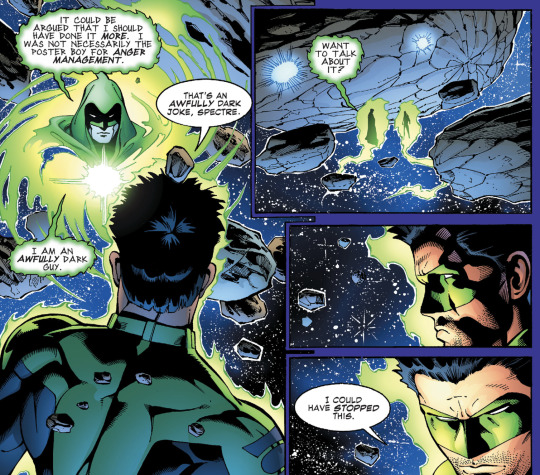

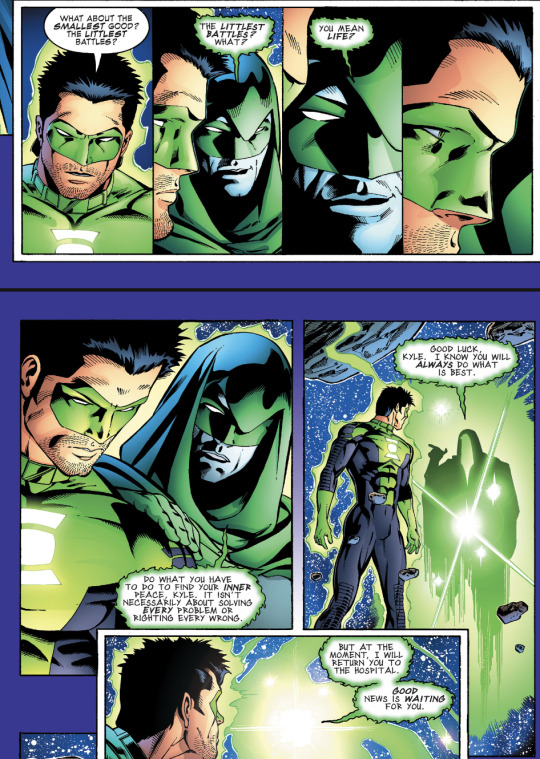
So then Kyle goes into Space to punch rocks and Spectre Hal comes to meet him. And discusses with him what Kyle could have done the things he has done. And Kyle acknowledges how many people he's helped but he's really stuck on Terry's life as his failure. To which Spectre Hal is like bro stop punching rocks and go home good news awaits.
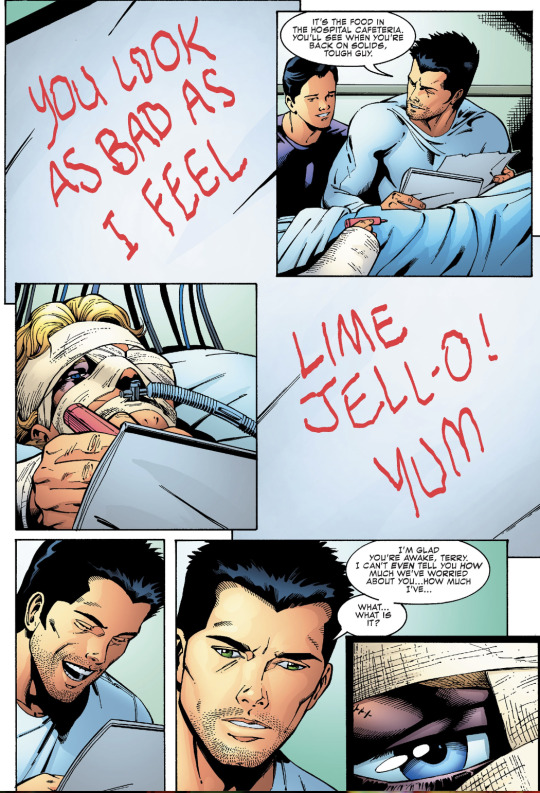
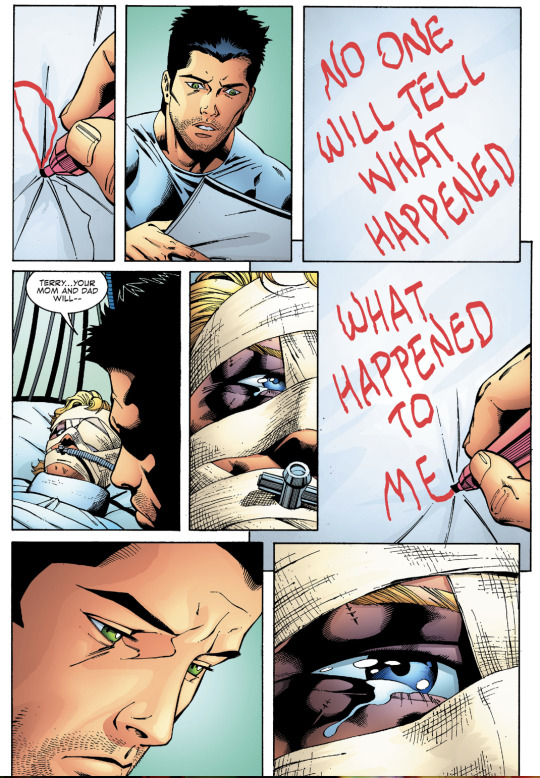
And Kyle is overjoyed about it. He sits down and speaks to Terry who has woken up but his memories are pretty hazy his skull was very damaged. Terry can't actually speak but write. And seeing Terry crying on the bed it just breaks Kyle in half

"I can't help these people now. I don't want to. Earth will have to get by without me."

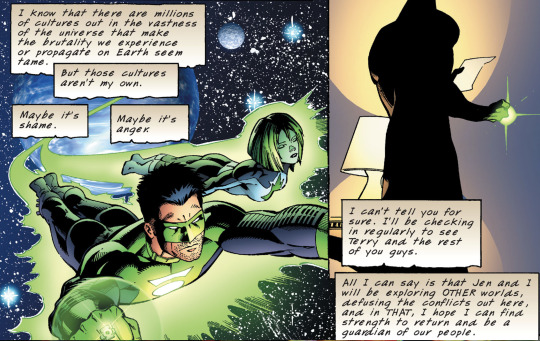
"I know that there are millions of cultures out in the vastness of the universe that make the brutality we experience or propagate on Earth seem tame. But those cultures aren't my own. Maybe it's shame. Maybe it's anger. I can't tell you for sure."
And so Kyle writes a letter to John Stewart and leaves him a power ring to protect Earth with. Kyle abandons Earth because he couldn't handle the idea of protecting people who would do something like a gay bashing. That's so deeply personal. It is insane they have never elaborated on how Queer of a story this is. Not just in a bringing attention to gay rights but in an exploration of who Kyle is as a person.
When I read this story years ago I said yeah he cares a lot about Terry which is absolutely true Kyle adored that kid. But I compared it a lot to the 90s Hate Crime arc (yes there are two hate crime arcs) where it was about race and in that instance, Kyle could only be an observer as he worked with Connor Hawke who was actually facing racism but it was mainly about the larger context of racism and how rich people exploit it. This version of hate crime is so much more personal to Kyle himself. He decides he literally can't live on Earth where his people are so filled with hatred he just can't
34 notes
·
View notes
Text
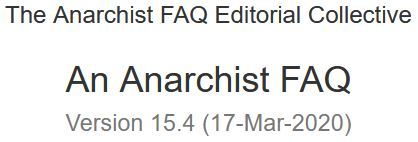
I.5.3 Would confederations produce bureaucrats and politicians?
Of course, any organisation holds the danger that the few who have been given tasks to perform could misuse their position for personal benefit or, over time, evolve into a bureaucracy with power over the rest of society. As such, some critics of social anarchism suggest that a system of communes and confederations would simply be a breeding ground for politicians and bureaucrats. This is obviously the case with the state and many generalise from this experience for all forms of social organisation, including the anarchist commune.
While recognising that this is a danger, anarchists are sure that such developments are unlikely in an anarchy. This is because, based on our analysis and critique of the state, we have long argued for various institutional arrangements which reduce the danger of such things developing. These include electing delegates rather than representatives, giving these delegates a binding mandate and subjecting them to instant recall by their electors. They would not, in general, be paid and so, in other words, delegates are expected, as far as possible, to remain in their current communities and conduct their communal tasks after their usual work. For the few exceptions to this that may occur, delegates would receive the average pay of their commune, in mutualism and collectivism or, in communism, no special access to communal resources. Moreover, it seems likely that regular rotation of delegates would be utilised and, perhaps, random selection as happens in jury duty today in many countries. Lastly, communes could leave any confederation if its structure was becoming obviously misshapen and bureaucratic.
By these methods, delegates to communal bodies would remain under the control of their electors and not, as in the state, become their masters. Moreover, anarchists have stressed that any communal body must be a working organisation. This will reduce bureaucratic tendencies as implementing tasks will be done by elected delegates rather than faceless (and usually unelected) bureaucrats. This means, as Bakunin put it in 1868, that “the Communal Council” (made up of delegates “with binding mandates and accountable and revocable at all times”) would create “separate executive committees from among its membership for each branch of the Commune’s revolutionary administration.” [Bakunin, No Gods, No Masters, vol. 1, p. 155] Thus would no longer be a body of people, a government, separate from the delegates of the people. This, it should be noted, echoed Proudhon’s comments from 1848:
“It is up to the National Assembly, through organisation of its committees, to exercise executive power, just the way it exercises legislative power … Besides universal suffrage and as a consequence of universal suffrage, we want implementation of the binding mandate. Politicians balk at it! Which means that in their eyes, the people, in electing representatives, do not appoint mandatories but rather abjure their sovereignty! That is assuredly not socialism: it is not even democracy.” [Op. Cit., p. 63]
Due to mandating and recall, any delegate who starts to abuse their position or even vote in ways opposed to by the communal assembly would quickly be recalled and replaced. As such a person may be an elected delegate of the community but that does not mean that they have power or authority (i.e., they are not a representative but rather a delegate). Essentially they are an agent of the local community who is controlled by, and accountable to, that community. Clearly, such people are unlike politicians. They do not, and cannot, make policy decisions on behalf of (i.e., govern) those who elected them — they are not given power to make decisions for people. In addition, people in specific organisations or with specific tasks will be rotated frequently to prevent a professionalisation of politics and the problem of politicians being largely on their own once elected. And, of course, they will continue to work and live with those who elected them and receive no special privileges due to their election (in terms of more income, better housing, and so on). This means that such delegates would be extremely unlikely to turn into representatives or bureaucrats as they would be under the strict control of the organisations that elected them to such posts. As Kropotkin argued, the general assembly of the community “in permanence — the forum always open — is the only way .. . to assure an honest and intelligent administration” as it is based upon ”distrust of all executive powers.” [The Great French Revolution, Vol. 1, p. 211]
The current means of co-ordinating wide scale activity — centralism via the state — is a threat to freedom as, to quote Proudhon, “the citizen divests himself of sovereignty, the town and the Department and province above it, absorbed by central authority, are no longer anything but agencies under direct ministerial control.” “The Consequences” he continued, “soon make themselves felt: the citizen and the town are deprived of all dignity, the state’s depredations multiply, and the burden on the taxpayer increases in proportion. It is no longer the government that is made for the people; it is the people who are made for the government. Power invades everything, dominates everything, absorbs everything.” [The Principle of Federation, p. 59] In such a regime, the generation of a specific caste of politicians and bureaucrats is inevitable.
Moreover, ”[t]he principle of political centralism is openly opposed to all laws of social progress and of natural evolution. It lies in the nature of things that every cultural advance is first achieved within a small group and only gradually finds adoption by society as a whole. Therefore, political decentralisation is the best guaranty for the unrestricted possibilities of new experiments. For such an environment each community is given the opportunity to carry through the things which it is capable of accomplishing itself without imposing them on others. Practical experimentation is the parent of ever development in society. So long as each distinct is capable of effecting the changes within its own sphere which its citizens deem necessary, the example of each becomes a fructifying influence on the other parts of the community since they will have the chance to weigh the advantages accruing from them without being forced to adopt them if they are not convinced of their usefulness. The result is that progressive communities serve the others as models, a result justified by the natural evolution of things.” [Rudolf Rocker, Pioneers of American Freedom, pp. 16–7] The contrast with centralisation of the state could not be more clear. Rocker continued:
“In a strongly centralised state, the situation is entirely reversed and the best system of representation can do nothing to change that. The representatives of a certain district may have the overwhelming majority of a certain district on his [or her] side, but in the legislative assembly of the central state, he [or she] will remain in the minority, for it lies in the nature of things that in such a body not the intellectually most active but the most backward districts represent the majority. Since the individual district has indeed the right to give expression of its opinion, but can effect no changes without the consent of the central government, the most progressive districts will be condemned to stagnate while the most backward districts will set the norm.” [Op. Cit., p. 17]
Little wonder anarchists have always stressed what Kropotkin termed “local action” and considered the libertarian social revolution as “proceed[ing] by proclaiming independent Communes which Communes will endeavour to accomplish the economic transformation within … their respective surroundings.” [Peter Kropotkin, Act For Yourselves, p. 43] Thus the advanced communities will inspire the rest to follow them by showing them a practical example of what is possible. Only decentralisation and confederation can promote the freedom and resulting social experimentation which will ensure social progress and make society a good place to live.
Moreover, confederation is required to maximise self-management and reduce the possibility that delegates will become isolated from the people who mandated them. As Rocker explained:
“In a smaller community, it is far easier for individuals to observe the political scene and become acquainted with the issues which have to be resolved. This is quite impossible for a representative in a centralised government. Neither the single citizen nor his [or her] representative is completely or even approximately to supervise the huge clockwork of the central state machine. The deputy is forced daily to make decisions about things of which he [or she] has no personal knowledge and for the appraisal of which he must therefore depend on others [i.e. bureaucrats and lobbyists]. That such a system necessarily leads to serious errors and mistakes is self-evident. And since the citizen for the same reason is not able to inspect and criticise the conduct of his representative, the class of professional politicians is given added opportunity to fish in troubled waters.” [Op. Cit., p. 17–18]
These principles, it must be stressed, have worked well on a mass scale For example, this is how anarcho-syndicalist unions operate and, as was the case with the CNT in Spain in the 1930s, worked well with over one million members. There were also successfully applied during the Spanish Revolution and the federations of collectives produced by it.
So the way communes and confederations are organised protect society and the individual against the dangers of centralisation, from the turning of delegates into representatives and bureaucrats. As Bakunin stressed, there are two ways of organising society, “as it is today, from high to low and from the centre to circumference by means of enforced unity and concentration” and the way of the future, by federalism “starting with the free individual, the free association and the autonomous commune, from low to high and from circumference to centre, by means of free federation.” [Michael Bakunin: Selected Writings, p. 88] In other words, “the organisation of society from the bottom up.” [The Basic Bakunin, p. 131] This suggests that a free society will have little to fear in way of its delegates turning into politicians or bureaucrats as it includes the necessary safeguards (election, mandates, recall, decentralisation, federalism, etc.) which will reduce such developments to a small, and so manageable, level (if not eliminate it totally).
#anarchist society#practical#practical anarchism#practical anarchy#faq#anarchy faq#revolution#anarchism#daily posts#communism#anti capitalist#anti capitalism#late stage capitalism#organization#grassroots#grass roots#anarchists#libraries#leftism#social issues#economy#economics#climate change#climate crisis#climate#ecology#anarchy works#environmentalism#environment#solarpunk
7 notes
·
View notes